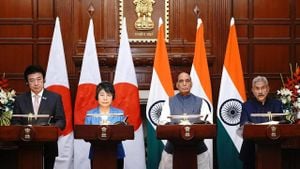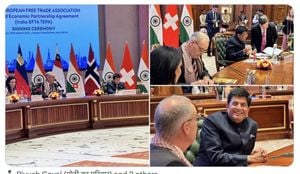Throughout the past several years, the European Union (EU) has faced significant challenges concerning migration and asylum policies, particularly as global unrest, economic uncertainties, and rising anti-immigration sentiments have heightened. The central narrative revolves around the EU's response to migration flows, its policy adaptations, and the lived experiences of individuals caught within these political shifts.
Recently, amid tightening immigration constraints, the experiences of Egyptians and other migrants have emerged as poignant case studies. Mariam Mahdy, a 30-year-old Egyptian scientific project manager who relocated to France three years ago, epitomizes the struggles many foreign nationals face. “Some people treat me as if I am a burden, taking someone else’s place,” she reflects. Despite finding success in her neuroscience career, the pervasive anti-immigrant sentiment makes her feel unwelcome. ”I will never be at home in France,” she adds, expressing fear for her safety and future.
Mahdy is not alone. According to reports, approximately 30% of Egyptians who live abroad have chosen Europe as their destination, primarily driven by economic pursuits and opportunities. This migration is often fueled by stark economic realities at home, where the inflation rate has surged above 11% and the currency has faced repeated devaluation. Economic instability continues to compel Egyptians, as many look beyond their borders for improved prospects.
Yet, the EU’s migration policies have been reshaped dramatically since the unprecedented migrant crisis of 2015, when over one million displaced individuals sought refuge from conflict-ridden regions, such as Syria, Iraq, and Afghanistan. Since then, European states have increasingly tightened their borders and reformed their asylum practices. The latest stipulations culminated with the passage of the “Migration Pact” which, adopted by the European Parliament and Council, signals the extent of legislative shifts on the horizon. Approved by all 27 EU member states, it covers various aspects of the asylum process, including biometric data collection and the initial screening of asylum seekers upon arrival.
This pact, fully implemented by June 2026, poses numerous questions about the future treatment of migrants and the accessibility of asylum. Countries like Germany, France, and the Netherlands have already begun reinstated border checks, evoking the specter of increasing barriers to entry for migrants. For example, during the Benelux summit scheduled for early December, discussions are poised to encompass both cross-border collaborations and the reimplementation of border controls to combat human smuggling, highlighting the urgency of these matters to European leadership.
Mahdy’s situation highlights the shifting connotations of the term “immigrant,” which increasingly resonates with negative associations amid rising political tensions and rhetoric around national identity. Youssef Khaled, another migrant residing in Germany, echoes her sentiments. Having moved to Dresden six years ago for his studies, Khaled reports how feelings of safety and belonging diminish against the backdrop of heightened anti-immigrant discourse. “The anti-immigration sentiment here makes me feel unsafe and disrupts my sense of belonging,” he states. Khaled often faces discrimination based solely on his name, which he feels fundamentally undermines his efforts to secure housing or employment. “It had nothing to do with my ability to pay rent or my professional qualifications,” he shares, illuminating the harsh realities faced by many non-Western immigrants.
European attitudes toward migrants have undoubtedly shifted, dictated by both socio-economic factors and the rise of far-right populism. The 2023 elections indicated significant traction for far-right parties across multiple EU member states, including France and Germany, creating apprehension among immigrant communities. The rise of these parties, which often critique immigration and advocate for ethnonationalism, fuelling xenophobia, plays intricately with sentiments surrounding migrants. Even as Mahdy tries to carve out her place within French society, she remains vigilant against the background of political rhetoric. “I see far-right parties gaining more power every day, and it makes me unsure of the future,” she admits, highlighting the precarious position many migrants now find themselves.
Polling data indicates an alarming trend, with younger generations exhibiting more anti-immigrant attitudes than their predecessors. Specifically, surveys suggest young adults across parts of Europe increasingly align with nationalist rhetoric, depicting migration as a threat to their cultural identities and job security. This evolution exacerbates the challenges non-European immigrants, such as Mahdy and Khaled, face as they navigate the socio-political landscapes of their adopted nations.
With these developments underway, any semblance of stability appears increasingly fragile. For many prospective migrants hoping to find refuge or opportunity within Europe, the future seems uncertain. “I think this could make Egyptians living abroad even more stressed,” Mahdy asserts, encapsulating the fears shared by many citizens of non-EU nations seeking to establish themselves within European societies. Amid tightened borders and increasingly stringent regulations on immigrants, the EU’s shifting political climate raises serious questions about the commitment to humanitarian principles—questions to which answers seem harder to come by amid rising nationalist sentiments and increasing anti-immigrant policies.
Hence, as world events continue to stir migration waves, the complexity of human experience within this societal backdrop must be examined. From policy decisions to the personal stories of individuals, the intertwined narratives of migration illuminate the broader tensions shaping contemporary Europe. Not only do such experiences drive home the need for compassion and empathy, but they also demand systemic change to honor the values of inclusion and humanity at the heart of what Europe has historically represented.
Consequently, as discussions continue at the governmental level, ordinary lives hang precariously, reflecting the broader narrative of shifting migration policies. The closure of borders and restrictive asylum measures may provide short-term political relief for some European nations, yet one must ask at what cost? The experiences of immigrants like Mahdy and Khaled urge contemplation: as nations erect barriers and fortify borders, is society prepared to reckon with the ramifications of such actions on the lives of those seeking solace?



